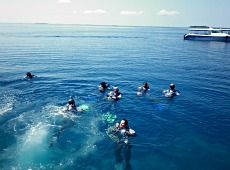The World Bank has approved a US$10 million grant to the Maldivian government to expand and strengthen the education system.
In a statement, the World Bank noted that the country’s education system faced key challenges including a “sharp drop” in enrollment at higher secondary level.
“The higher secondary education net enrollment rate is a mere 19 percent, with boys’ net enrollment at 20 percent and girls’ net enrollment at 19 percent,” the World Bank stated.
“It is important that the education development program also addresses the quality of education through several strategic initiatives. In this regard, the project will support the development of a system of regular National Assessments of Learning Outcomes, which can inform policy formulation and program development” said World Bank Country Director for Sri Lanka and the Maldives, Diarietou Gaye.
The US$10 million project will include professional development for teachers and a quality assurance program at school level.
“School-based management activities and the annual school feedback form (ASFF) program will be also implemented at the school level,” the statement read.
“The school heads and senior management teams will be responsible for the organisation and management of these activities. The principals and senior management teams will lead the internal self-evaluations of the quality assurance process. They will also lead the needs assessments of teacher skills and competencies in relation to the school development plans, and organise the professional development programs required. The school heads and senior management teams will also be responsible for implementing the ASFF program,” the World Bank stated.
The Maldives has 220 public schools spread across the country’s 200 inhabited islands, with 6000 teachers serving a 62,000 students. Approximately 1700 students attend private schools.
In a statement. President Mohamed Waheed meanwhile observed that many schools in the Maldives had very small student populations, “an issue of great concern for the nation.”
Speaking during a visit to Maduvvari on Meemu Atoll, Waheed said the average number of students per classroom was 3-4, and that in some schools the entire student body consisted of no more than eight.
Given the state of these schools, “a lot of very urgent reform measures are needed to improve teaching techniques and obtain better results,” the statement read.
System in crisis
The O’Level pass rate in the Maldives has steadily increased from 27 percent in 2008 to 37 percent in 2011. Beyond a general claim that the O’Level pass rate for 2012 was the “highest on record”, the Education Ministry has so far withheld the figures for 2012, citing “difficulties in analysis”.
Education leaders have repeatedly highlighted as one of the country’s greatest social challenges that fact that two-thirds of students leave the education system at age 16, with little possibility of employment until they reach 18,
Outside the rare apprenticeship program offered by the resort industry – such as one run for more than 10 years by the Four Seasons group – the Maldives has little in the way of vocational training programs.
With the large trade and construction sectors dominated by a massive and poorly-paid imported workforce, options for young Maldivians are extremely limited, especially if isolated on an island in a remote part of the country.
Young Maldivian women face further challenges, as they are largely excluded from the country’s largest employer – the fishing industry – and despite the opportunities, few work in the resort industry due to persistent social stigma.
In a 2011 report on the issue, one father told Minivan News: “If my daughter would not have the possibility of going home every night, I would not let her work in the resort, it is not safe […] if a woman will not come home at night after work, and she would maybe have a relationship with a man in the resort, which could result in a pregnancy… this would have very bad impact on the family and would not be tolerated.”
More recently, Four Seasons Resorts Maldives Regional Vice President and General Manager, Armando Kraenzlin told Minivan News that the number of females in the company’s apprenticeship program had declined over the last 10 years, to just two in the 2014 intake.
“We never had many [female] participants – five to seven per batch – but it used to be easier [to recruit women] about 10 years ago. Unfortunately, numbers have dropped,” he said, at the program’s class of 2013 graduation.
Education Minister Dr Asim Ahmed said the prospect of their female children living and working on a resort was a difficult concept for parents.
“The culture here is for children to grow up and grow old in same house. In the Maldives, you go to work [at a resort] and live there. It’s a very difficult thing to get your head around,” he said.
Ahmed explained the need for women and parents to be more aware about the conditions of female employees working at resorts, particularly in terms of accommodation arrangements.
“It is important parents buy into this and believe resort work is beneficial and reliable [for their daughters]. The other challenge is we have to provide child care and other facilities that will release the women to go and work,” he added.



